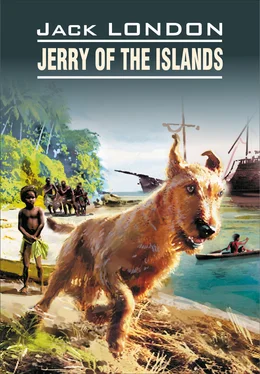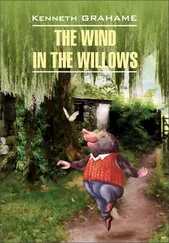1 ...7 8 9 11 12 13 ...18 But at the doorless entrance to the lazarette aft, he threw caution to the winds and darted in in pursuit of the new scent that came to his nostrils. A strange person was in the low, dark space whom he had never smelled. Clad in a single shift and lying on a coarse grass-mat spread upon a pile of tobacco cases and fifty-pound tins of flour, was a young black girl.
There was something furtive and lurking about her that Jerry did not fail to sense, and he had long since learned that something was wrong when any black lurked or skulked. She cried out with fear as he barked an alarm and pounced upon her. Even though his teeth scratched her bare arm, she did not strike at him. Not did she cry out again. She cowered down and trembled and did not fight back [65] did not fight back – ( разг. ) даже не защищалась 55
. Keeping his teeth locked in the hold he had got on her flimsy shift, he shook and dragged at her, all the while growling and scolding for her benefit and yelping a high clamour to bring Skipper or the mate.
In the course of the struggle the girl over-balanced on the boxes and tins and the entire heap collapsed. This caused Jerry to yelp a more frenzied alarm, while the blacks, peering in from the cabin, laughed with cruel enjoyment.
When Skipper arrived, Jerry wagged his stump tail and, with ears laid back, dragged and tugged harder than ever at the thin cotton of the girl’s garment. He expected praise for what he had done, but when Skipper merely told him to let go, he obeyed with the realization that this lurking, fear-struck creature was somehow different, and must be treated differently, from other lurking creatures.
Fear-struck she was, as it is given to few humans to be and still live. Van Horn called her his parcel of trouble [66] parcel of trouble – ( разг. ) куча проблем (неприятностей)
, and he was anxious to be rid of the parcel, without, however, the utter annihilation of the parcel. It was this annihilation which he had saved her from when he bought her in even exchange for a fat pig.
Stupid, worthless, spiritless, sick, not more than a dozen years old, no delight in the eyes of the young men of her village, she had been consigned by her disappointed parents to the cooking-pot. When Captain Van Horn first encountered her had been when she was the central figure in a lugubrious procession on the banks of the Balebuli River.
Anything but a beauty – had been his appraisal when he halted the procession for a pow-wow. Lean from sickness, her skin mangy with the dry scales of the disease called bukua, she was tied hand and foot and, like a pig, slung from a stout pole that rested on the shoulders of the bearers, who intended to dine off of her [67] intended to dine off of her – ( разг. ) собирались ею пообедать
. Too hopeless to expect mercy, she made no appeal for help, though the horrible fear that possessed her was eloquent in her wild-staring eyes.
In the universal bêche-de-mer English, Captain Van Horn had learned that she was not regarded with relish by her companions, and that they were on their way to stake her out up to her neck in the running water of the Balebuli. But first, before they staked her, their plan was to dislocate her joints and break the big bones of the arms and legs. This was no religious rite, no placation of the brutish jungle gods. Merely was it a matter of gastronomy. Living meat, so treated, was made tender and tasty, and, as her companions pointed out, she certainly needed to be put through such a process. Two days in the water, they told the captain, ought to do the business. Then they would kill her, build the fire, and invite in a few friends.
After half an hour of bargaining, during which Captain Van Horn had insisted on the worthlessness of the parcel, he had bought a fat pig worth five dollars and exchanged it for her. Thus, since he had paid for the pig in trade goods, and since trade goods were rated at a hundred per cent. profit, the girl had actually cost him two dollars and fifty cents.
And then Captain Van Horn’s troubles had begun. He could not get rid of the girl. Too well he knew the natives of Malaita to turn her over to them anywhere on the island. Chief Ishikola of Su’u had offered five twenties of drinking coconuts for her, and Bau, a bush chief, had offered two chickens on the beach at Malu. But this last offer had been accompanied by a sneer, and had tokened the old rascal’s scorn of the girl’s scrawniness. Failing to connect with the missionary brig, the Western Cross, on which she would not have been eaten, Captain Van Horn had been compelled to keep her in the cramped quarters of the Arangi against a problematical future time when he would be able to turn her over to the missionaries [68] to turn her over to the missionaries – ( разг. ) передать ее с рук на руки миссионерам
.
But toward him the girl had no heart of gratitude because she had no brain of understanding. She, who had been sold for a fat pig, considered her pitiful rôle in the world to be unchanged. Eatee she had been. Eatee she remained. Her destination merely had been changed, and this big fella white marster of the Arangi would undoubtedly be her destination when she had sufficiently fattened. His designs on her had been transparent from the first [69] had been transparent from the first – ( разг. ) были ясными с самого начала
, when he had tried to feed her up. And she had outwitted him by resolutely eating no more than would barely keep her alive.
As a result, she, who had lived in the bush all her days and never so much as set foot in a canoe, rocked and rolled unendingly over the broad ocean in a perpetual nightmare of fear. In the bêche-de-mer that was current among the blacks of a thousand islands and ten thousand dialects, the Arangi ’s procession of passengers assured her of her fate. “My word, you fella Mary,” one would say to her, “short time little bit that big fella white marster kai-kai along you.” Or, another: “Big fella white marster kai-kai along you, my word, belly belong him walk about too much.”
Kai-kai was the bêche-de-mer for “eat.” Even Jerry knew that. “Eat” did not obtain in his vocabulary; but kai-kai did, and it meant all and more than “eat,” for it served for both noun and verb.
But the girl never replied to the jeering of the blacks. For that matter, she never spoke at all, not even to Captain Van Horn, who did not so much as know her name.
It was late afternoon, after discovering the girl in the lazarette, when Jerry again came on deck. Scarcely had Skipper, who had carried him up the steep ladder, dropped him on deck than Jerry made a new discovery – land. He did not see it, but he smelled it. His nose went up in the air and quested to windward along the wind that brought the message [70] the wind that brought the message – ( зд. ) ветер, который донес запах земли
, and he read the air with his nose as a man might read a newspaper – the salt smells of the seashore and of the dank muck of mangrove swamps at low tide, the spicy fragrances of tropic vegetation, and the faint, most faint, acrid tingle of smoke from smudgy fires.
The trade, which had laid the Arangi well up under the lee of this outjutting point of Malaita, was now failing, so that she began to roll in the easy swells with crashings of sheets and tackles and thunderous flappings of her sails. Jerry no more than cocked a contemptuous quizzical eye at the mainsail anticking above him. He knew already the empty windiness of its threats, but he was careful of the mainsheet blocks, and walked around the traveller instead of over it.
Читать дальше












